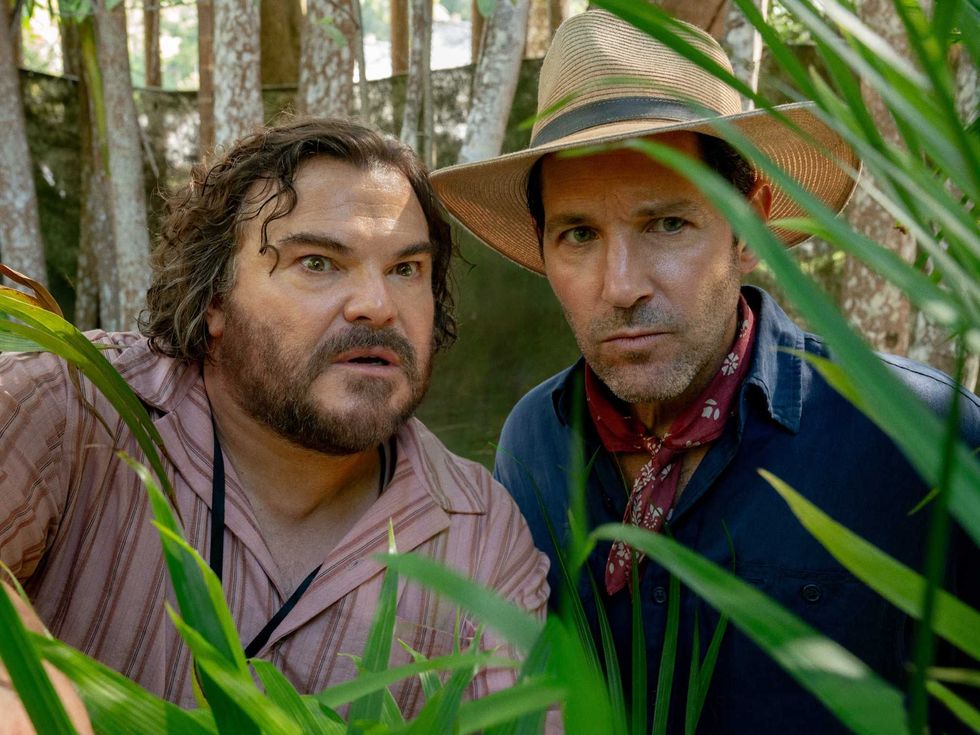Things are getting serious now as we crack the Radiohead Top 20. Give us your feedback (surely, you cannot disagree) about the placement of songs 20-11.
Song 20: "Nude"
Album: "In Rainbows"
Adobe Flash Required for flash player.
Here is proof that a great song can withstand anything. A decade in the making, “Nude” went through many incarnations (and titles) before landing on "In Rainbows," where it ended up sounding like it was meant to be there in the first place.
You can easily find versions from the "OK Computer" era if you search online. “Nude” was then distinguished by dual keyboards from Thom Yorke and Jonny Greenwood, and the song had a mournful soulfulness about it that really stood out.
But how can you possibly deny the ethereal, elusive beauty of what the band did when they finally got it on record? There is nothing that can compare with Yorke’s swirling falsetto coos as the song plays out to its conclusion. Words like beautiful and breathtaking fall far short of the mark. I just know that I don’t ever want that section of the song to end once it begins.
And yet none of it would work if the framework of the song wasn't so strong to start, a hauntingly sad melody and lyrics that evoke a world of disappointment and longing without saying much at all. “Nude” came out just fine after all, but then again it always a matter of when it would become a classic, not if.
Song 19: "Optimistic"
Album: "Kid A"
Adobe Flash Required for flash player.
Leave it to Radiohead to include lines about flies, vultures, cannibalistic fish, and dinosaurs in a song called “Optimistic.” There is great courage to the refrain, “If you try the best you can/The best you can is good enough,” especially considering the not so pretty picture Thom Yorke paints in the verses. For us “nervous messed up marionettes,” trying is worthwhile, even if we’re doomed to fail.
Rock diehards likely latched onto this song when "Kid A" arrived, confronted as they were by the unfamiliar sounds of the rest of the album.
“Optimistic” is the most traditional-sounding track, even with Jonny Greenwood’s ondes martenot weaving through the proceedings. But the song never feels out of place, nor does it seem like a throwback.
The tom-tom heavy, rigid beat of Phil Selway and the itchy guitar rhythms propel the proceedings, but the highlight is the chorus, when Colin Greenwood’s bass goes soaring skyward, way higher than you expect it to go, to mirror Yorke’s vocal. It’s one of the chill-inducing moments that the band produces on a regular basis, but it’s not the only reason this song is ranked so high. It’s one of those tracks with nary a wasted moment, tight and precise, yet swaggering with confidence. Good enough and then some.
Song 18: "Thinking About You"
Album: "Pablo Honey"
Adobe Flash Required for flash player.
I know I’ll probably get grief about putting this song so high on the list, but you will not catch me apologizing for it. Many people will argue that the simplicity of the recording, mainly acoustic guitar with Jonny Greenwood’s harmonium providing hints of melancholy color, makes it automatically inferior to the recordings found on "Kid A" or "In Rainbows" — or whatever.
But songs can get the job done in a number of ways. The Beatles broke all manner of boundaries with recordings like “Strawberry Fields Forever” or the "Sgt. Pepper’s" album, but that in no way mitigates the power of so-called simpler songs like, say, “She Loves You” or “This Boy.” Different strokes, that’s all.
So to knock a song like “Thinking About You” because it lacks bells and whistles, or because it’s more lyrically and melodically direct, seems like folly to me. This song contains a great, sing-along melody, which is one of the hardest things for any songwriter to pull off. But the depth of the writing is there, even if the lyrics are straightforward.
Darker themes like jealousy and obsession rise to the surface on this story of a down-on-his-luck bloke whose ex has hit the big time and left him behind. (Not hidden at all is the intimation that masturbation is his only refuge from his pain.)
Finally, I can’t say enough about the vocal performance of Thom Yorke here. It feels lived-in and honest, and the way that he always seems to be just behind the music embodies his character’s self-loathing lethargy brilliantly. Think about some of the whining and mewling that typifies today’s radio balladry, and his effort stands out even more.
So, even if the band has left behind the recording methods that brought about “Thinking About You,” that doesn’t make those methods any less effective. And even if the band has for the most part traded in the more personal theme of this song in favor of broader concerns, it doesn’t make this character’s plight any less resonant.
Despite all of the surface differences between it and later material, the craft behind “Thinking About You” is impeccable, bottom line. Arguing against that ... well, I don’t understand it at all.
Song 17: "Street Spirit (Fade Out)"
Album: "The Bends"
Adobe Flash Required for flash player.
As the second guitarist in a band in which Jonny Greenwood usually plays lead guitar, it’s understandable how Ed O’Brien often falls off the radar in band discussions. And yet the steadiness of his playing is integral to Radiohead's success, because it allows Jonny to go off on his daredevil flights and sonic experiments knowing that the core of the song will remain strong.
On “Street Spirit,” O’Brien’s steadiness becomes brilliance right before our ears, playing arpeggios that tug at the heartstrings with every clarion note. From there the rest of the song can be built, and yet, at the end, it comes back to the arpeggio once again, not quite fading out so much as bidding us a melancholy farewell (and bidding a farewell to "The Bends" as well).
Thom Yorke has spoken about the dark alleyways that his lyrics traverse here, as they alternate between desperate hope and resigned despair, despair getting the better of it. Some light creeps in as Yorke sings, “Immerse yourself in love” at song’s end, piercing through the Gregorian chant backing vocals, but it’s fleeting.
Through it all, those arpeggios persevere. In a way, I feel like they keep this song from being too dark, melancholy as they may be. O’Brien’s playing presses on through it all, unwavering, courageous even, beckoning us to do the same, steady as we go.
Song 16: "Jigsaw Falling Into Place"
Album: "In Rainbows"
Adobe Flash Required for flash player.
Thom Yorke on the club scene. Who woulda thunk it?
Yet here he is, nailing the inner workings of a one-night-stand-to-be with lothario cool and anthropological attention to detail. His descriptions, all flash cuts and quick shots, are practically cinematic.
The band makes a typically atypical move here. Whereas the obvious choice would have been to go back to some of the artificial rhythms of "Kid A" or "Amnesiac" to portray the desired atmosphere, Radiohead goes with a whooshing acoustic groove that keeps right up with one of Yorke’s more wordier compositions.
Dare I say that the vibe of the song reminds me of “Hazy Shade Of Winter” by Simon & Garfunkel? Yes, I dare!
Yorke’s lyrics get the short shift sometimes, but they shouldn’t be ignored here. He nails the impossibility of true connection between these two damaged souls, impassively rifling off his observations as if he were reading them from notes he had taken. He finally takes off in the chorus, warning his protagonists that while they seek such fleeting physical pleasures to feel more alive, they’ll end up having no more choice as to how things turn out than inanimate puzzle pieces forever fated to end locked in the same position.
“Jigsaw Falling Into Place” is some of the sexiest music the band has ever laid down, even as the song itself clinically deglamorizes the act of hooking up.
Song 15: "Life in a Glass House"
Album: "Amnesiac"
Adobe Flash Required for flash player.
Radiohead knows how to wrap an album up, don’t they? They must have sensed they didn’t have the right candidate laying around to send off "Amnesiac," which is why they went in and cut this monumental track in the period before the album’s release (whereas the rest of the album was recorded during the sessions which also yielded "Kid A").
Good choice on the band’s part. And what an inspired choice then to bring in Humphrey Lyttleton and his jazz band to take this song to another level. The horns bring the perfect amount of melancholy warbling to the verses, as the trombone and clarinet play off each other as if they were having their own private conversation independent of Thom Yorke’s musings.
In the chorus though, they get their act together and all come booming in for a common purpose, creating a New Orleans funeral effect to go along with Yorke’s wails. A funeral is just what Yorke’s lyrics demand, as they bemoan the death of common decency and good graces, those quaint notions replaced by intrusiveness, venom, and scapegoating.
Yorke’s clever turns of phrases and subtle broadening of the scope keep this from being just another celebrity bitching about the price of fame. “Life In A Glass House," as aided by those majestically sad horns, becomes nothing less than a requiem for empathy.
Song 14: "Motion Picture Soundtrack"
Album: "Kid A"
Adobe Flash Required for flash player.
The Beatles once closed out their weirdest album with “Good Night,” which featured Ringo Starr softly whispering a farewell to all the listeners as harps and strings played the song out. Radiohead takes a similar tack on “Motion Picture Soundtrack,” wrapping up the defiantly untraditional "Kid A" with a song that sounds like Walt Disney in a dour mood.
The harps and angels that the band conjures here are seriously at odds with the message of the bulk of the song, as Thom Yorke plays a wheezy pipe organ and bemoans the fact that the movies “fed us on little white lies,” all of which seem to have failed his at-wit’s-end protagonist.
With the sampled harp on overload, Yorke signs off in typically ominous fashion: “I will see you in the next life.” Take that line along with the references to wine and sleeping pills and you can make the easy jump and infer that the character is about to off himself. I’ve never taken such a literal look at it myself though. I look at the song’s message as a general disillusionment with the way the promises our culture spoon-feeds us often bear little resemblance to reality. The rest of Yorke’s lyrics are just a way to amp up the drama.
However you choose to read it, “Motion Picture Soundtrack” is a stunning closer, hauntingly performed by Yorke and brilliantly conceived in terms of production. Whether you hear that final line as hopeful or harrowing, you can’t deny it’s an unforgettable way to say goodbye.
Song 13: "A Punchup at a Wedding"
Album: "Hail to the Thief"
Adobe Flash Required for flash player.
Considering that Radiohead is a band for which critical hosannas are pretty much the norm, it’s probably a shock to their system when they get a dash of the negative stuff thrown their way. This underrated track from "Hail to the Thief" was apparently inspired by a thumbs-down review of a performance which the band themselves thought was top-notch.
As someone who knocked a few (though only very few) of the band’s songs earlier in this list, you might think I would have a problem with this one. But if a critic can sound off on someone, than the soundee has every right to fire right back in kind. And when you can fire right back as effectively as the band does on “Punchup,” well then, score one for them.
This is the band at its most funky, achieving a groove with Colin Greenwood’s slinking bass and some downbeat piano chords not unlike something you would hear from mid-period Steely Dan. Static-charged blasts of guitar add some spunk to the later verses. And I love the “no, no” part at the start and conclusion, the way they’re all overdubbed on top of each other to make it sound about a thousand Thom Yorkes as a melancholy mob.
Yorke pretty much makes minced meat of his detractors, reducing their purple prose to “The pointless snide remarks/Of hammerheaded sharks.” He also boils it down to brass tacks, calling into doubt the veracity of the critic’s account: “I was there and it wasn’t like that.” Wedged into a tight melody, these words singe through the speakers.
No, I’ll rarely criticize the message, just the execution of said message. On “A Punchup at a Wedding,” the boys get their message across loud and clear: Criticize a good Radiohead show at your own peril.
Song 12: "The National Anthem"
Album: "Kid A"
Adobe Flash Required for flash player.
You’ve got the bedrock of the song: Thom Yorke’s grimy bassline, Phil Selway’s snare-heavy beat, and the vocals, repetitive in melody but altered just so throughout via trickery, intoning the spare lyrics. But in “The National Anthem,” in many ways the sonic centerpiece of "Kid A," the periphery becomes primary.
All the weird bursts of sound at the start of the track that sounds like someone’s changing the radio stations in hell; the ondes martenot weaving around hypnotically into the few open spaces allowed it; the horns, insanely idiosyncratic, blasting away with seemingly no regard for what the others are doing or even for how they sound within the song itself.
All of it somehow coheres, somehow makes sense in spite of itself.
That bass never relents, wending its way through the carnage all around it, persisting even when it’s barely audible. Yorke himself has to shout above the din in the frenzied climax: “It’s holding on.”
What is “it”, you may ask? The fear? The chaos? The music? It’s never revealed, but you can glean the answer from the desperation in his voice.
In the closing seconds of this monumental song, the crazy horns fall away and you hear a distant recording of what sounds like an actual national anthem, all dignified and composed. It also sounds almost surreal, because, after over five minutes of the anarchy of the sound that defines Radiohead’s “The National Anthem,” your ears can’t possibly be expected to comprehend anything traditional right away. Come to think of it, they might not be able to comprehend anything normal ever again.
Song 11: "Airbag"
Album: "OK Computer"
Adobe Flash Required for flash player.
Full disclosure: An airbag did save my life. Well, I can’t say that for sure, but the facts are that I was going 55 MPH and hit a guard rail head on, the airbag deployed, and I’m still around to write long-windedly about great rock bands.
You do the math.
The lumbering guitar riff that kicks off “Airbag,” the opening salvo off the majestic "OK Computer," is positively primordial. But it’s no more than a decoy for what’s to come, a quicksilver, heady mix of elements that produce an exotic and seductive track. Phil Selway’s sampled drum beat pulls you forward then stops you short, while Colin Greenwood’s bass line hiccups along, communicating far more by what it leaves out than what it keeps.
This unusual rhythm section allows room for some underwater guitar effects to enter, providing just the right amount of psychedelic wash for these surreal proceedings. Thom Yorke delivers one of his finest vocals here, as he blends the addled confusion of a car-crash survivor with the testifying fervor of someone who truly believes himself to be born again.
The lack of control that passengers have in automobiles mirrors the individual helplessness that pervades the entire album. “Airbag” conveys the odd feeling of being saved by technology from technology, and it does so with awesome grandeur that few bands could hope to touch.











